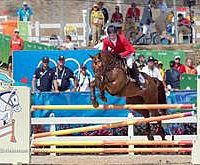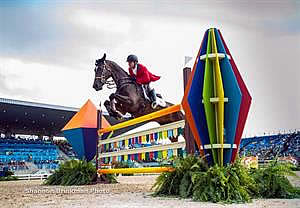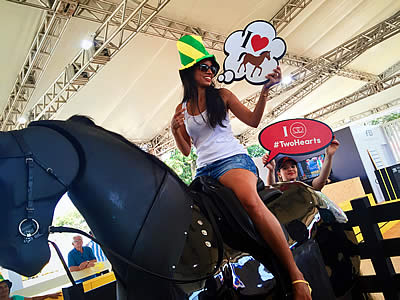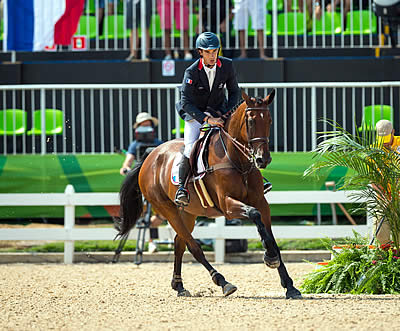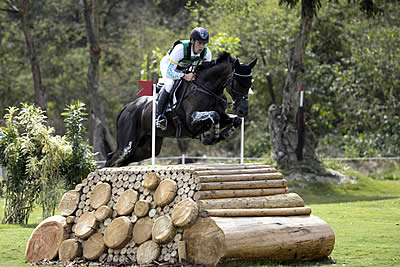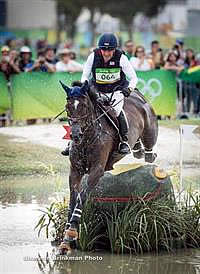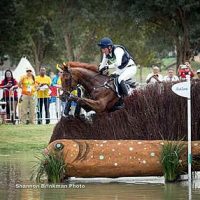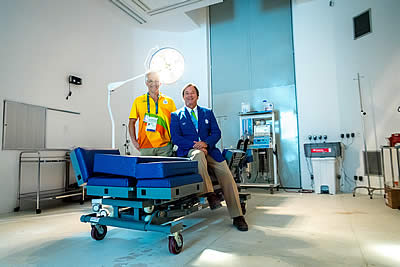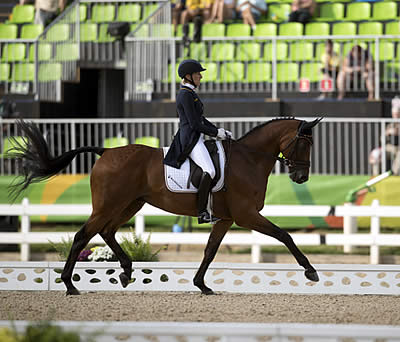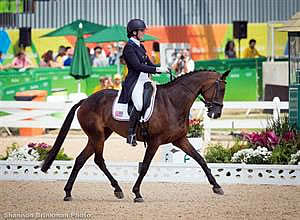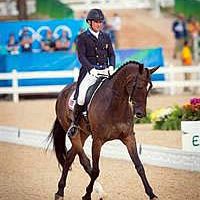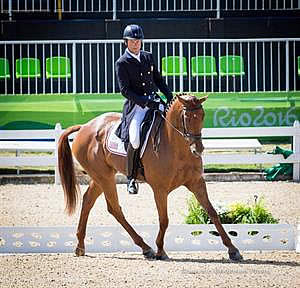Christopher Burton and Santano ll. (FEI/Dirk Caremans)
Rio de Janeiro (BRA), 8 August 2016 – Australia, Eventing team gold medallists in Barcelona 1992, Atlanta 1996 and Sydney 2000, heads both the team and individual standings in Olympic Eventing after a day of cross-country thrills, spills and surprises at the Rio 2016 Olympic Equestrian Venue in Deodoro, topping the teams on 150.3 and with Christopher Burton in pole position in the individual rankings with Santano II. But their neighbours from New Zealand are stalking them closely going into Tuesday’s final showjumping phase, just 4.5 penalties adrift, with the French in hot pursuit in overnight bronze a further 6.2 off the pace.
Germany, London 2012 team gold medalists and leaders after dressage, dropped to fourth on 172.8, while Britain’s William Fox-Pitt plummeted from pole position on the individual leaderboard to 22nd after a runout at the final element of the Ski Jump at fence 20 on a course that all the riders agreed was an enormous test. The statistics tell the tale of a tough day at the office, with eight of the 13 teams reduced to just three team-members, and USA and Russia no longer in contention after retirements and eliminations.
Only Brazil, France and Great Britain will have full four-member sides as Tuesday’s action begins, provided all goes well in the early-morning horse inspection.
Influential
It was clear from the outset that the 33-fence track would prove hugely influential, and with three of the first eight riders biting the dirt it more than lived up to expectations.
Sam Griffiths got the Australians off to the perfect start, however, when cruising home with the lovely Irish mare, Paulank Brockagh, with only 6.8 time penalties to add to his dressage score, and when Burton and his super-talented nine-year-old, Santano ll, produced one of just three zero scores on the day then things were looking even better. That was reinforced by another great run from Stuart Tinney and Pluto Mio who put just 2.8 time penalties on the board, so even though Shane Rose was eliminated late on the track with CP Qualified they still went out in front at the end of the day.
With New Zealand pathfinder Tim Price out of the picture after a slip-up on the flat, the remaining Kiwis had no choice but to keep it together and they succeeded brilliantly, the legendary Sir Mark Todd (Leonidas ll), Clarke Johnstone (Balmoral Sensation) and Tim Price’s wife, Jonelle Price (Faerie Dianimo) each collecting just time faults to leave them on a scoreline of 154.80.
Meanwhile, Astier Nicolas (Piaf de B’Neville) set up the French with a fault-free run so they could drop the 50.40 collected by Karim Laghouag (Entebbe) who ran into trouble at the first of the two angled brush fences at 12. Team-mate Thibaut Valette (Qing du Briot) also faulted at this one but came home with a relatively modest 24.4 penalties to add, while Mathieu Lemoine (Bart L), individually third after dressage, took a careful tour of the track, and the final team tally of 161.00 was good enough for overnight third.
Successive
The German dream of a third successive team title took a hammering despite a brilliant clear from defending team and individual Olympic champion Michael Jung (Sam) when Julia Krajewski (Samourai du Thot) was eliminated, so mistakes from Sandra Auffarth (Opgun Louvo) and Ingrid Klimke (Bob) had to be taken into account to drop the team from first to fourth.
But Jung (40.9 penalties) is stalking individual leader, Burton (37.6), very closely and with less than a single fence advantage the 34-year-old Australian will be under extreme pressure Tuesday. Frenchman Nicolas is just 1.1 penalty points further behind in third, while Kiwi Todd (46.0) just shades America’s Philip Dutton (Mighty Nice) on 46.8 and Boyd Martin (Blackfoot Mystery), 50.9 in fifth and sixth. Burton said his horse is “very inexperienced” so he took some longer options on the course, “but the horse is so fast. I couldn’t believe it… he is a rocket!”
Sensationally, Brazil’s Carlos Parro has rocketed up all the way from 33rd place after dressage to hold equal-seventh spot with New Zealand’s Clarke Johnston (Balmoral Sensation). Riding Summon up the Blood, and on a day when so many of the major stars of the sport failed to find the key to the course set by Frenchman Pierre Michelet, the 37-year-old Brazilian, 236th in the world rankings, will be taking on the very best in the battle for Olympic glory. And his team is lying fifth ahead of The Netherlands in sixth as the new day begins.
Unfolded
As the competition unfolded, riders quickly learned from those who went before them, but tackling the many complex questions on the course still proved a difficult task. The reality was that only a speedy run on the direct routes would be fully rewarded, but that meant risking a glance-off or stop if the skinny combination obstacles in particular didn’t come up right. In all there were 15 eliminations and two retirements while 38 of the 65 starters collected fence penalties.
Of the top 18 riders going into Tuesday’s showjumping phase, the first three all completed without adding anything to their dressage score and the remainder picked up only time penalties. In all, 27 horse-and-rider combinations had clear jumping rounds and this group included some very special horses like the 10-year-old gelding, The Duke of Cavan, who carried Japan’s Oiwa Yoshiaki through the extremely challenging double of brush corners at fence six on the direct route to slot into 17th spot, and the super-honest 13-year-old Ranco who wasn’t going to be rushed but who did himself and his Chilean rider, Carlos Lobos Munoz, justice as he carefully negotiated the entire track to finish 30th.
All four of the British contingent collected both fence and time penalties to slot into eighth place and Fox-Pitt was clearly disappointed at his own result. “I had a very good round; it was just annoying that I went off at that third element (of the Ski Jump). It was my fault entirely. I went too quickly I think… and there was no way I could turn him. He didn’t do anything wrong. Watching those first few horses, you could see the course was asking questions all the way, and a lot of them weren’t coming up with the answers,” he added.
Clear
French pathfinder Astier Nicolas was just third to go with Piaf de B’Neville and returned clear within the time. “It was such a good feeling. I realised the pressure – I had to do well for my team-mates, and that’s a huge feeling. I didn’t expect to have such stress and joy for the team competition. It’s a very demanding course and there’s never a place to drop your reins and let him breathe,” he said after moving up from 11th to third place.
Michael Jung’s clear promoted him to silver medal spot, but he said he didn’t have an easy time before he set off on his cross-country run. “The warm-up was difficult on Sam’s nerves. The loudspeakers, horses galloping by, the cheering spectators. He was already sweaty in the stables. He was overly motivated in the beginning but nevertheless wonderful. He gave me a good feeling and was still fresh at the finish line and staying inside the time was easier than I expected,” he explained.
Mark Todd said, “I had instructions from the team to stay safe and clear. Fence six had me worried but it was mostly a perfect round. The horse (Leonidas ll) was brilliant all the way through. I was told to take one long route and briefly thought, ‘do I disregard the order?’ But then I thought I should better behave myself!”
Exceeded
Individual leader, Christopher Burton, said that finding himself in gold medal spot going into the final day “has far exceeded my expectations!” He’s not getting too carried away, however. “My horse is good at dressage and I was told to take one long route and it worked out, so I’m just going to enjoy today and for tomorrow? Whatever….”
Course designer, Pierre Michelet, felt he had provided plenty of different options for the riders to get themselves around the track. “You could change your mind and take a different route if you needed it,” he said, “but I was surprised there were a lot of run-outs and dramatic things happening!”
Sir Mark Todd summed it all up. “I want to thank Pierre for building this course because if he hadn’t then we (New Zealand) wouldn’t be in silver medal position tonight! The course offered alternatives to everyone; it was perfectly jumpable but if you wanted to made a medal position then you had to go direct and fast.”
The next hurdle to cross is the final horse inspection at 08.00 Tuesday morning before the medal-deciding showjumping phase of Eventing which will begin at 10.00.
Quotes:
Mark Todd (NZL), talking about negotiating the “frog” fence at the end of the Fisherman’s Lake complex: “It was a relief to get over that one. The fences are coming quick and fast… two hedges and then the frog – that is hard at 570 metres a minute. There is no room for error.”
Sam Griffiths (AUS): “It was a tough course and I was lucky to be on such a good horse. I am over the moon. What a star. To go straight overall you must be a gold medal rider.”
Tim Price (NZL), talking about his fall on the flat on the way to fence 24 with Ringwood Sky Boy: “You walk the course so many times, you make so many plans and then you go out and fall over! But that is the nature of the game. I had planned the long route (at 23/24) from the beginning and on the first turn it happened. I am so gutted. My horse is absolutely fine.”
Boyd Martin (USA): “I’m so grateful I was on an old racehorse from Kentucky (Blackfoot Mystery)! He kept fighting the whole way home. It’s one of those courses where you can’t ease up for one second. You’ve got to jump, get through one fence then think about the next.
“I’m relieved. My biggest fear was letting everyone down, especially the group that bought him, my team-mates, and my country. The biggest thing that motivates me is to not fail. I have to say, I thought I was fit but I’m not (laughs). I ride events week after week after week and I’ve never been gassed (short of breath) after cross country, which goes to show how hard I had to work to get him around!”
Astier Nicolas (FRA): “I feel very proud this evening being in third place amongst riders like these! If I ride until Mark’s age I still have 33 years to go! We have three relatively young talents on our team, and it’s great for us all to be here.”
Results here
FEI OLYMPIC HUB: For further information visit the FEI Olympic Hub which is dedicated to all things Olympic and Paralympic, both old and new: here.
Support Olympic Equestrian using social tags #Equestrian #Eventing #Jumping #Dressage #ParaDressage #Rio2016 #Olympics #TwoHearts
Equestrian in the Olympics
Equestrian sport has been part of the Olympic Games since 1912. Team and individual medals are awarded in three disciplines – Dressage, Eventing and Jumping.
The equestrian events in Rio will be staged in the Deodoro Olympic Park, the second largest Olympic cluster, alongside basketball, BMX, canoe slalom, fencing, hockey, modern pentathlon, mountain biking, rugby sevens and shooting.
The countries represented in Equestrian in Rio are: Argentina, Australia, Austria, Belarus, Belgium, Brazil, Canada, Chile, China, Chinese Taipei, Colombia, Denmark, Dominican Republic, Ecuador, Egypt, Finland, France, Germany, Great Britain, Ireland, Italy, Japan, Korea, Mexico, Morocco, Netherlands, New Zealand, Palestine, Poland, Peru, Puerto Rico, Qatar, Republic of South Africa, Russia, Spain, Switzerland, Sweden, Turkey, Ukraine, Uruguay, USA, Venezuela and Zimbabwe.
They will compete in:
Jumping: 27 countries, 15 teams, 75 horse/rider combinations
Eventing: 24 countries, 13 teams, 65 horse/rider combinations
Dressage: 25 countries, 11 teams, 60 horse/rider combinations
By Louise Parkes
Media Contacts:
Rio 2016:
Anja Krabbe
Venue Media Manager
anja.krabbe@rio2016.com
+55 (21) 97556 1218
FEI:
Shannon Gibbons
Manager Press Relations
shannon.gibbons@fei.org
+41 78 750 61 46
Ruth Grundy
Manager Press Relations
Email: ruth.grundy@fei.org
Tel: +41 787 506 145
Leanne Williams
Manager Press Relations
leanne.williams@fei.org
+41 79 314 24 38
